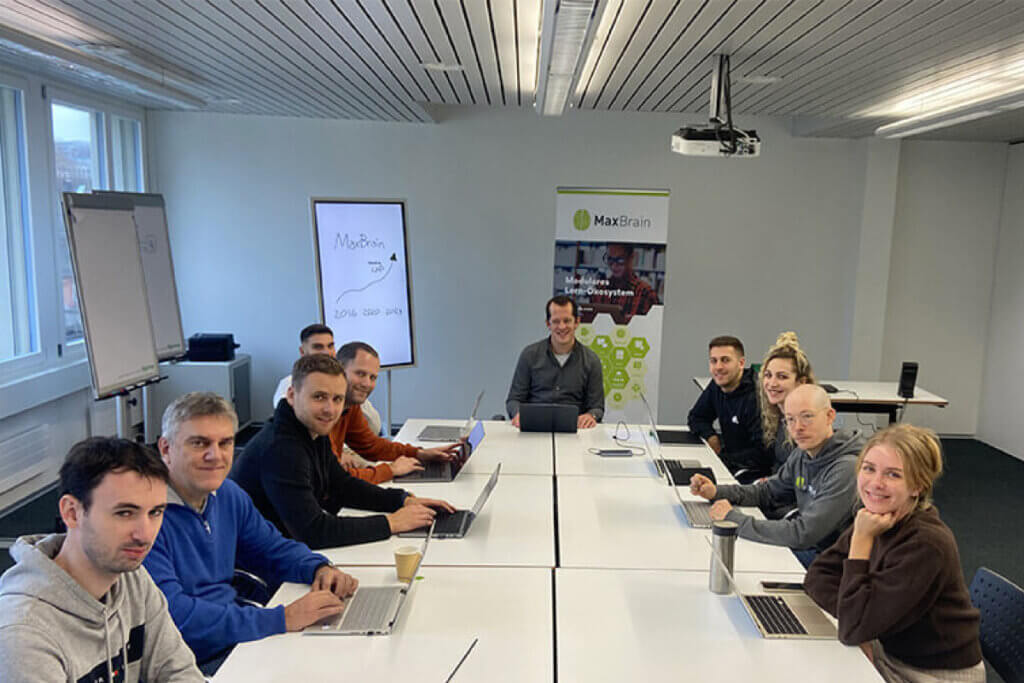Employee retention (summary)
Michèle Marbach, Managing Director of the training provider ZweiStunden - Wissen kurz&bündig and HR development expert, discusses the following factors for employee retention:
1. wages in line with the market,
2. personal growth opportunities,
3. corporate culture,
4. strong managers,
5. recognition,
6- work environment,
7. work-life balance,
8. job security,
9. purpose,
10. open communication.
Further training is the central factor that positively influences all others in order to strengthen employee loyalty.
Andrea Anderheggen from MaxBrain (Andrea): Good morning, Michèle! I'm delighted to be talking to you today about a far-reaching and exciting topic for all companies: Employee retention.
ZweiStunden is recommended by MaxBrain as a course provider for many topics related to personal development. You have probably already worked with hundreds, if not thousands, of HR specialists. Your expertise is therefore very relevant for the readers of our blog. Thank you very much for this interview!
Michèle Marbach from ZweiStunden: Good morning! The pleasure is all mine!
Yes, that's true: At ZweiStunden, I have been holding talks with HR managers for years, including on the topic of employeeretention, as it is called in many places these days. Not only that: we offer special seminars on this and other topics and directly help to inspire employees!
Further training is a decisive factor in retaining employees.
Introduction: Why employee retention is important for companies
Andrea Anderheggen: Why is it important for companies to prioritize employee retention in the first place?
Michèle Marbach: Successfully retaining employees is important for several reasons:
Firstly, employee retention ensures that employees' specialist knowledge and experience remain within the company and do not migrate elsewhere.
This is critical to success, as the know-how of employees is the most important asset in many companies. If internal expertise is lost permanently or for a period of time, a company can risk losing its raison d'être.
Secondly, employee retention reduces costs much more than many managers realize.
Calculate what it costs to recruit new employees and train them for weeks or months.
The challenge of finding and retaining talent no longer only affects individual companies: Many industries are now suffering from a shortage of skilled workers or a general lack of employees and are struggling to fill positions successfully. The competition for talent is huge.
Employee retention is about much more than just a nice feel-good culture.

The 10 factors for employee retention
Andrea Anderheggen: Let's dive a little deeper into the factors that are crucial for employee retention. What do you think they are?
-
Wages in line with the market and/or other benefits
-
personal growth opportunities: In terms of your own career and personal skills,
-
the corporate culture and the corporate values on which it is based,
-
strong managers,
-
Recognition for the work performed,
-
a positive working environment,
-
a healthy work-life balance,
-
Job security in general,
-
the purpose of one's own work for the company or society,
-
open communication.
1. wages and employee retention
Andrea Anderheggen: How relevant are wages in line with the market really? There are many people who apparently prefer jobs that are comparatively less lucrative but more exciting and fulfilling?
Michèle Marbach: Yes, that's true. At a certain point, money is not so important for many people. That has always been the case: people strive for fulfillment. Money is at most a means to an end and only up to a certain point. -
What's more, in our affluent society, your own money is something that most people don't have to worry about every day. Fortunately.
Nevertheless, competitive salaries are fundamental for most employees. Employees need to feel that they are paid fairly for their skills and contributions.
Not only that: recognition is also very effective in motivating employees and retaining them in the company. And paying good wages is one of the ways in which companies can credibly express their appreciation.
In the long run, it is risky to praise an employee or emphasize how grateful you are for their work if, at the end of the month, they are paid a salary that is below market value or below the employee's expectations. At some point, recognition turns into frustration.

2. personal development is extremely motivating.
Andrea Anderheggen: That sounds plausible. How do you see the second factor you mentioned for retaining employees, i.e. personal growth opportunities?
Michèle Marbach: Personal growth opportunities are extremely motivating for most people.
The fact is: employees are more likely to stay if they are successful or if they see a way to develop themselves and make a career.
Of all living beings, humans have the greatest freedom to develop. The more knowledge, the more possibilities. The more possibilities, the greater and more fascinating the personal potential for the future.
The offer to learn new skills in order to work more effectively, more easily or more quickly is therefore extremely attractive for employee retention.
A company that invests in employee training proves that it is genuinely interested in the personal well-being of its employees. The company can thus Employee branding to attract further talent, which in turn can increase the company's success. A positive upward spiral develops.
Andrea Anderheggen: Yes, I can confirm that. Our MaxBrain customer, Zweifel Pomy Chips AG, follows exactly this idea when it comes to employee branding and offers its own very inspiring company academy specifically for this purpose.
Michèle Marbach: That doesn't surprise me: companies like Zweifel, which have made a name for themselves as top employers, attach great importance to such measures.
In contrast to the previously mentioned topic of wages, the interests of employees and their company are much more congruent when it comes to further training: The more productive employees are thanks to further training, the more value they create for the company.
Further training is therefore something that is actually a complete "no-brainer" for employee retention and should be offered by every company today.
Andrea Anderheggen: "Actually"? Why "actually"?
Michèle Marbach: In practice, many companies find it difficult to offer effective training.
It starts right at the top: Management must become fully aware of the importance of employee productivity, and consequently skills and consequently training.
It's not that easy when you have to manage X departments, inspire customers, develop competitive products, satisfy shareholders and constantly deal with minor operational crises. Even if you understand and value the importance of further training as a manager, the question remains as to when you can make time for it.
The problem of time does not only affect the management.
It goes through all levels of an organization. If a team is under pressure to meet a deadline for a customer project, a sales deal or product development, there is hardly any time left for valuable long-term training.
Short-term priorities often stand in the way of long-term success.
To summarize: Continuing education must have a fixed place in the hectic working day. Otherwise it won't work.
Once the time has been freed up for this, further questions immediately arise:
What exactly do you want to achieve with employee training? What learning content or development measures make sense? What do the employees actually want? How exactly is the training organized? Which learning platform should be used for a company academy or learning program? How can learning programs be designed to be as relevant and personalized as possible?
For effective, professionally organized training, these questions must be answered. Otherwise, it will remain an offer that no one will be enthusiastic about in the long term.
Fortunately, there are specialized companies such as ZweiStunden or MaxBrain that can add significant value to training initiatives. In cooperation with talented HR managers and the management, forms of learning can be created that have a strong positive impact on the success of a company.

3. managers play a major role in whether employees stay or not.
Andrea Anderheggen: Let's discuss some other factors for employee retention. You mentioned the strength of managers earlier. What does this have to do with employee retention?
Michèle Marbach: Effective leadership means setting a clear direction, communicating transparently, giving employees trust and freedom of action and supporting them in achieving their goals.
If employees value and trust their managers, they are more likely to remain committed to the company.
You must never forget that employees and managers are people who have different relationships with each other. Managers who not only challenge but also encourage and pull together with employees to make the company more successful are inspiring.
As with friendships, people feel obliged to other people to whom they owe a lot, who they like or in whose presence they feel good. Good managers are therefore able to retain good employees.

4. a positive working environment retains employees.
Andrea Anderheggen: The working environment also plays a role, doesn't it?
Michèle Marbach: Absolutely. A positive working environment in which employees feel respected, heard and valued can significantly strengthen loyalty to the company.
The working environment is shaped by many factors, from a culture of inclusivity and respect to the physical design of the workplace.
The working environment is closely linked to all other factors. It is decisively shaped by all those involved, lived by all employees, strengthened by the personal growth of employees and supported by the corporate culture.
5. work-life balance: only with the right balance.
Andrea Anderheggen: What about the balance between work and private life?
Michèle Marbach: The work-life balance can be of crucial importance. If the balance gets out of kilter on one side or the other, it often has dire consequences for everyone.
Employees need time for personal interests, family and themselves. Companies that respect these needs and offer flexible working hours or home office options generally have happier and more productive employees.
However, the level must not swing too far to the side of employees' personal needs.
The most successful companies in the world are still the ones where people work hard. It is an illusion to believe that the most successful companies in the world, such as Apple, Google, Amazon and the like, would be so successful if the employees there only cared about their personal interests, family or themselves.
I don't mean to praise these companies as role models. Not at all. But the fact is that it takes a lot of effort and performance in every company to be successful in a competitive market. Building up or expanding a company successfully is no walk in the park.
Andrea Anderheggen: Can't I hear some criticism?
Michèle Marbach: Yes, sometimes you have to remember that little usually comes from little and that success sometimes requires a little effort.
Employee retention is not a one-way street. It requires a commitment to the company from all sides, from managers and employees alike. Otherwise the company will not be successful in the end.
And if the company is not successful, what do you think the employees do then?
Andrea Anderheggen: Looking for a new job?
Michèle Marbach: Exactly - the term "work-life balance" should therefore include not only "life", but also "work" and "balance". This is the only way a company can be successful, inspire and retain employees.

6 Job security: A fundamental concern.
Andrea Anderheggen: You mentioned job security as well as recognition.
Michèle Marbach: Job security is a fundamental concern. When employees know that their job is stable, it gives them the security that has a positive effect on their overall satisfaction and performance.
Technological progress is moving faster than ever before. Next year, the future prospects of many companies could look radically different and job security could be called into question.
Andrea Anderheggen: What can you do about it?
Michèle Marbach: The answer is simple: further training.
If employees undergo further training to keep up with the times or even help shape the future, they are more likely to help shape the company in a future-oriented and flexible way. And this results in greater job security for everyone.
The connection between job security and further training can hardly be recognized without this context. Further training has probably never been so important for job security in the history of mankind.
7 Purpose: An important factor for employee retention, but not the only one.
Andrea Anderheggen: Interesting, yes. You mentioned earlier that the meaningfulness of your own work also helps to retain employees. Can you explain that a little more?
Michèle Marbach: Yes, in management literature this is sometimes referred to as "purpose". If employees see a purpose in what they do, they are more likely to stay with the same employer.
Generation Z in particular, i.e. today's 18 to 25-year-olds, is said to have a comparatively strong interest in purpose, in perceiving the value of their own work for society or for "the world". Companies that are not interested in the well-being of society or the environment and do not create any recognizable added value find it more difficult to find and retain young talent.
However, purpose has its limits, even among idealistic exponents of Gen Z. A glance at most Instagram profiles is enough to see that what money can buy has its value; for example, nice trips, experiences, good food, nice clothes. The principle that you work to earn money has certainly not died, despite the search for a purpose.
The purpose can also relate to aspects other than just the product or service of a company.
If a team works very well together, experiences a lot of positive things together or - on the contrary - overcomes a crisis together, a strong sense of solidarity can develop. Employee loyalty to the company is then the result of loyalty to the team. The team itself then becomes a purpose.

8. corporate culture: culture eats strategy for breakfast.
Andrea Anderheggen: Does that mean it's worth investing in team building?
Michèle Marbach: Yes, or generally in the corporate culture and open communication.
There is the famous saying by management guru Peter Drucker:
"Culture eats strategy for breakfast."

Corporate culture is much more important than any strategy and is a decisive factor in retaining employees.
Why? Because an inspiring, motivating corporate culture creates the conditions for coming up with great ideas, deriving the best strategies from them and working on them with enthusiasm.
However, it is almost impossible to define a corporate culture.
Managers who try to define corporate cultures in writing almost always fail.
Culture is also comparable to a friendship: it develops dynamically from people being together, from dealing with each other and from common goals. You cannot "agree" on what corporate culture you have. You either live culture or you don't.
Communication also plays a central role, of course. Do you always want to communicate openly with everyone about everything, ups and downs, or would you rather only communicate in small, efficient teams? This is not an easy question and depends very much on the industries you work in and how well employees can handle information.
If the aim is to strengthen employee loyalty, open communication is certainly more advisable.

9. open communication: to be decided on a case-by-case basis.
Michèle Marbach: Communication also plays a central role, of course. Do you always want to communicate openly with everyone about everything, ups and downs, or do you prefer to work in small, efficient teams? That's not an easy question and very much depends on the sectors you work in and how well employees can handle information.
If the aim is to strengthen employee loyalty, open communication is certainly more advisable.
10. further training shapes all factors for employee retention.
Andrea Anderheggen: At the end of this interview, I would like to briefly address a comment you made at the beginning: Namely, that all the factors for retaining employees are directly or indirectly influenced by a company's continuing education offering. As the provider of the MaxBrain learning platform, we naturally place a high corporate value on further training. And as the Managing Director of ZweiStunden, you probably "tick" in a similar way to us on this issue.
I would still be interested to know how you come to the conclusion that all factors for employee retention are positively influenced by further training.
Michèle Marbach: Thank you, yes, of course I was expecting that question.
Further training can indeed be seen as a central factor for employee retention. This is because all other factors can be significantly and positively influenced by further training.
At ZweiStunden, we work every day to ensure that people live their strengths and abilities authentically and thus practice mutual benevolent interaction at eye level. Our vision is to gradually make the world a better place for us all.

This can also be explained in concrete terms using the 10 points listed above:
1. wages: The better the training, the more competent an employee is, the more value he or she creates for the company. And the more value for the company, the more salary can be justified.
2. personal growth opportunities: Here, of course, continuing education plays a direct and evident role. Those who continue their education grow and open up new opportunities.
3. you guessed it: corporate culture and further training also go hand in hand for similar reasons. A culture in which employees are professionally and personally brilliant is automatically stronger, more inspiring and more successful. - Conversely, further training is a need that arises from a learning culture, which in today's market environment is advisable for every company - not to say essential for survival.
4. strong leaders: Leading people is a skill. Of course there are personalities who are more suited to leadership than others. But management is a craft, with rules, pitfalls and potential. And the faster you learn this know-how through further training - such as effective management courses - the faster the company can ensure that the quality of management is excellent.
5. recognition for work done: Further training plays several roles here: In order to do a good job in the first place, training can be crucial. In further training, employees often learn to better understand what they need to achieve in order to create real value for their customers, the company or other employees. Ideally, recognition is then the result of a comprehensive view that goes far beyond personal self-perception.
6 The chances of creating a positive working environment increase automatically thanks to good professional and personal development. We see this time and again after our courses and in feedback from HR managers.
7. further training also promotes a healthy work-life balance. Those who know more can usually work faster and therefore have more time for other things. Effective further training can inspire you personally to achieve more and improve your work-life balance.
8 As far as job security is concerned, I have already briefly explained the connection with further training. In a global economy driven by innovation and new technologies, it is extremely important for companies to help employees keep up with the times or even help shape the future. And this in turn creates the long-term job security that is needed to retain employees.
9 Purpose, finding meaning in one's own work, is also strengthened by further training. This is because effective further training ideally improves both professional and personal skills. And these in turn help to better understand work and colleagues, work together more efficiently towards common goals and become more tolerant when things don't go 100% according to plan.
10. open communication is promoted through further training that deals specifically with language, presentation and communication. At ZweiStunden, for example, we offer a course entitled "Clear language: get to the point!".
In two hours, the course teaches participants how to make themselves heard through clear messages. The course is very popular and usually has an immediate, positive effect on the participants' communication skills.
Andrea Anderheggen: Wow, yes, everything totally to the point, true to the ZweiStunden motto: "Knowledge in a nutshell". Michèle, thank you very much for this very insightful conversation about employee retention. It's a multi-layered, exciting topic that absolutely deserves more attention from companies.
Michèle Marbach: Yes, retaining talent is indeed crucial to the success of a company.
I would also like to say a big thank you to the readers, MaxBrain and you. It gives me great pleasure to talk about this important topic and I hope that you can take away one or two ideas from this brief insight.
Questions for you:
Did you like this article?
If so, please share this article on your social media channels. Thank you very much!





















